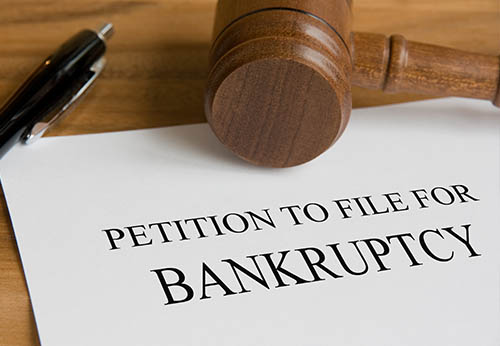Few things in life are as stressful as serious financial trouble. If you are currently struggling with money problems and considering bankruptcy, you’re probably feeling that stress. You may be exhausted from facing ever-mounting debt with no other end or solution in sight. You may be feeling lost, confused, frustrated, and downright overwhelmed at the prospect of facing bankruptcy. First and foremost, you are probably worried about the future, and what filing for bankruptcy could mean for you.
However, while your financial troubles may be stressful, they are absolutely survivable. In fact, you can get through your bankruptcy, and you don’t have to do it alone.
If you’re in the Birmingham, Alabama and greater Jefferson County area, there is a team of compassionate, experienced attorneys ready to advocate for you and help you resolve your financial situation, no matter how complicated. John Clark and the John Clark Law Firm are ready to bring their knowledge, resources, and expertise to the table to help you through this process.
 Call Us Now For A Personalized Case Evaluation (205) 506-3354
Call Us Now For A Personalized Case Evaluation (205) 506-3354
First Things First

What is Bankruptcy?
Bankruptcy is a legal process that can be filed in response to excessive debt. Filing for bankruptcy “discharges” many types of debt, meaning you are no longer responsible for paying them after the process. Filing immediately stops wage garnishment, creditor calls, and other collection actions. It can also temporarily stay foreclosure on your home and repossession of your car, giving you time to catch up with payments.
There are certain types of debt that are not affected by bankruptcy. These include debts owed to “secured creditors”, creditors who loaned you money with property as collateral.
This usually includes mortgages, leases, rent-to-own products, and some personal and business loans. Bankruptcy also does not protect cosigners on your debts. Finally, bankruptcy does not usually release you from certain financial obligations, such as child support, alimony, monetary court orders, criminal fines, some student loans, and some taxes.
Chapter 7 Bankruptcy
Commonly known as “liquidation bankruptcy,” this type of bankruptcy is meant for average-to-low income people. When filing Chapter 7, your trustee (a court-approved person entrusted with your financial affairs) makes an inventory of all of your assets to see what can be liquidated, or turned into cash. Some assets are exempt or excluded from liquidation.
Once assets and possessions are accounted for, you and your trustee hold a meeting with your creditors, and answer questions about your financial situation. If you have non-exempt assets, they are then liquidated and distributed among your unsecured creditors.
Secured creditors are either paid with an agreed-upon sum, or they can seize the property held as collateral on your loan. However, if you are able to make an agreement with your secured debtor and both catch up with and stay current on your payments, you can usually keep your home or your car through bankruptcy.
Chapter 13 Bankruptcy
Chapter 13 focuses on repayment of your debts rather than liquidating assets. Filers make a three-to-five year repayment plan for all or part of their debts, which has to be viable (meaning you have a provable way to show that you will have the future income or funds necessary to make payments.) If the plan is approved, you make regular payments to your creditors through your trustee until the end of the payment plan, at which point you are discharged from applicable debts.
Chapter 13 Bankruptcy is primarily used by debtors to avoid foreclosure on their home, make up missed payments on their mortgage or car, pay back taxes and avoid fines on their tax debt, and/or keep valuable, non-exempt property or assets.
Chapter 11 Bankruptcy
Chapter 11 Bankruptcy is primarily meant for businesses rather than individuals. It gives businesses time to reorganize their affairs and repay their debts to hopefully become financially solvent.
Chapter 11 Bankruptcy is often the most complex type of bankruptcy. Like Chapter 13 bankruptcy, it involves creating and committing to a reorganization plan, which includes a way to pay back their creditors over time. This plan must be accepted by creditors, bond and stockholders, and the bankruptcy court.
If successfully filed, Chapter 11 Bankruptcy can help owners keep their businesses (including control of possessions and assets), continue to oversee daily operations, and, in some instances, keep their stocks and bonds open for trade.
 Call Us Now For A Personalized Case Evaluation (205) 506-3354
Call Us Now For A Personalized Case Evaluation (205) 506-3354
Why do I need a bankruptcy attorney?

Technically, all bankruptcy cases can be filed “pro-se” (ie, without legal representation.) However, like many other gravely important legal matters, you are strongly advised to tackle bankruptcy on your own.
Bankruptcy cases can be very complex, and involve intricate laws that have loopholes, terms, and conditions that are difficult for the average person to understand. There are also many deadlines and other required actions involved, and missing any of them can have grave consequences. A skilled bankruptcy attorney will know how to navigate even the most complicated bankruptcy cases. They are familiar with the landscape of bankruptcy court and the structure of the law, and can help you find and pursue your best course of action.
Additionally, having an experienced bankruptcy attorney drastically improves your odds of a favorable outcome. Bankruptcy is not usually an easy process, but having an adept advocate and negotiator on your side with full knowledge of the law means you have a much better chance at keeping certain assets (such as your home), and negotiating terms for your repayment and your future that you are comfortable with. When it comes to bankruptcy, an attorney who will fight for you and argue fiercely on your behalf can make all the difference in the world.
In the Birmingham and Greater Jefferson County, Alabama area, John Clark Law Firm is where you will find that sort of attorney. Headed up by John Clark IV, a passionate, highly capable attorney with years of bankruptcy experience, the John Clark Law Firm is also a member of the Red Mountain Law Group, a network of law firms representing individuals and businesses across Alabama. This means you get the close attention of a small law firm and the benefits of working with a larger firm with many associated specialists and experts.
Are you struggling with debt and thinking about filing for bankruptcy? Call John Clark Law Firm for an 100 percent free, no-strings-attached consultation about your case. Let us show you what we can do for you.

